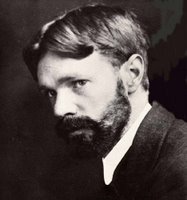 D. H. Lawrence born 11 September 1885 (d. 1930)
D. H. Lawrence born 11 September 1885 (d. 1930)David Herbert Lawrence was an important and controversial English writer of the 20th century, with his output spanning novels, short stories, poems, plays, essays, travel books, paintings, translations, literary criticism and personal letters. These works, taken together, represent an extended reflection upon the dehumanising effects of modernity and industrialisation. In them, Lawrence confronts issues relating to emotional health and vitality, spontaneity, sexuality, and instinctive behaviour.
Lawrence's unsettling opinions earned him many enemies, and he endured hardships, official persecution, censorship and the misrepresentation of his creative work throughout the second half of his life, much of which he spent in voluntary exile, self defined as a 'savage pilgrimage'. At the time of his death, his public reputation was that of a pornographer who had wasted his considerable talents. E M Forster, in an obituary notice, challenged this widely held view, describing him as 'the greatest imaginative novelist of our generation.' Later, the influential Cambridge critic F R Leavis championed both his artistic integrity and his moral seriousness, placing much of Lawrence's fiction within the canonical 'great tradition' of the English novel. He is now valued as a visionary thinker and a significant representative of modernism in English literature.
Lawrence was a twentieth-century maverick in his open and formally adventurous discussion of all sexual issues and especially homosexuality. Perhaps no other major modernist author was so continually absorbed in the subject of homosexual desire, a theme that continually informs Lawrence's work.
 Lawrence's greatest exploration of homosexual subject matter can be found in the novel, Women in Love (1920). Here, Lawrence and his wife Frieda are depicted as Rupert Birkin and Ursula Brangwen in a tale based partly on Lawrence's clamorous relationship with the writer Katherine Mansfield, her husband, the literary critic John Middleton-Murray (Gudrun and Gerald of the novel), and Lady Ottoline Morrell (Hermione Roddice).
Lawrence's greatest exploration of homosexual subject matter can be found in the novel, Women in Love (1920). Here, Lawrence and his wife Frieda are depicted as Rupert Birkin and Ursula Brangwen in a tale based partly on Lawrence's clamorous relationship with the writer Katherine Mansfield, her husband, the literary critic John Middleton-Murray (Gudrun and Gerald of the novel), and Lady Ottoline Morrell (Hermione Roddice).It was during the composition of Women in Love that Lawrence, frustrated by his failure to forge a deeper bond with Murray, evidently had a sexual relationship with a Cornish farmer named William Henry Hocking in the town of Tregerthen.
The short-lived affair was the culmination of a long-standing struggle with homosexual feelings. 'I would like to know why nearly every man that approaches greatness tends to homosexuality, whether he admits it or not', Lawrence wrote to a friend in 1913. Lawrence told another acquaintance, 'I believe the nearest I've come to perfect love was with a coal-miner when I was about sixteen.'
Yet Lawrence's inability to intensify his relationships with either Murray or Hocking generated his most forthright fictional examinations of homosexual desire, an intense five-year absorption in the subject that included not only Women in Love and Aaron's Rod (1922) but the treatise Goats and Compasses (1917) - which he destroyed - and the self-suppressed Prologue to Women In Love.
Lawrence, D. H. (1885-1930) [GLBTQ Encyclopedia]